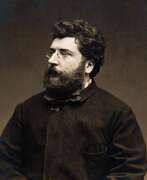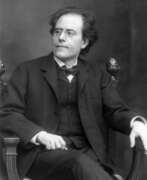Composers 19th century
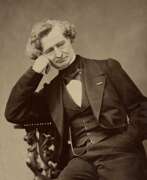

Hector Berlioz, full name Louis-Hector Berlioz, was a French composer, conductor, and music critic of the Romantic era.
Berlioz received his primary education from his father, an enlightened physician, who gave him his first lessons in music and Latin. By the age of 12, he was already composing music for local chamber ensembles and learning to play the guitar and flute with virtuosity. In 1821 his father sent him to Paris to study medicine, and he received his first scientific degree. But in parallel, he often visited the Paris Opera, where he studied the entire repertoire on the score.
Against the will of his parents, Berlioz took a compulsory course of study at the Conservatory of Paris and in 1830 received the Prix de Rome. In Italy he met the Russian composer Mikhail Glinka and became lifelong friends with Mendelssohn. From 1832 Berlioz worked for 30 years as a music critic for periodicals. He was acquainted with many of the leading writers and musicians of his time, including Victor Hugo, Alexandre Dumas, Niccolò Paganini, and George Sand.
Berlioz adored the works of Weber and Beethoven, as well as Gluck, and tirelessly introduced audiences to their works. As a result of his many trips as a conductor to Germany, Belgium, England, Russia, and Austria-Hungary, he taught the leading orchestras of Europe a new style.
Berlioz during these years wrote, among other things, the "Symphonie Fantastique" (1830) that made him famous, and the symphony "Harold in Italy" (1834). After a concert in 1838, where he conducted their performance, the famous violin virtuoso Paganini declared Hector Berlioz a continuator of Beethoven's musical traditions and presented him with 20,000 francs. A grateful Berlioz wrote a choral symphony, Romeo and Juliet, dedicated to Paganini.
In 1844, Berlioz created "Treatise on Modern Instrumentation and Orchestration", which is not just a technical manual, it served as an introduction to the aesthetics of expression in music for generations to come. Among Berlioz's dramatic works, The Damnation of Faust (1846) and The Nativity (1854) are world-famous.
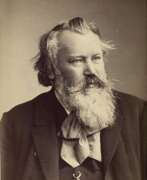

Johannes Brahms was a great German composer, conductor and pianist of the Romantic era.
Johannes showed a talent for music early on, learning to play the piano and earning a living from it; in 1850 he met the Hungarian violinist of Jewish origin Eduard Remenyi - from him he learned gypsy music, which often manifested itself in his later work.
In 1853, Brahms had a fateful encounter with the composer Robert Schumann. Schumann wrote an enthusiastic article about Brahms in a periodical, and from that moment the general public became aware of the young talent. In 1859 Brahms was appointed conductor of the women's choir in Hamburg, which gave him ample time for his own work. During this period he composed two Serenades for orchestra and a String Sextet in B flat major, and completed the Piano Concerto No 1 in D minor. A little later he settled in Vienna and directed the Singakademie choir.
In 1868 Brahms completed his most famous choral work, the German Requiem, which is still considered one of the most important works of 19th century choral music. The following year he composed two volumes of Hungarian Dances for piano duet - these were brilliant arrangements of gypsy melodies, their success was phenomenal, and they were performed all over the world.
For the rest of his life, Brahms never stopped composing works in a wide variety of genres: symphonies, concertos, chamber music, piano works, choral works, waltzes and songs. Brahms was a great master of the symphonic and sonata style of the second half of the nineteenth century, which placed him in the first ranks of German composers. He made his last concert appearance in March 1897, and died of cancer in Vienna in April.
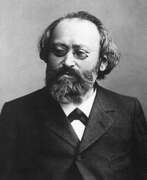

Max Bruch, full name Max Christian Friedrich Bruch, was a German composer and conductor, violinist and teacher of the late Romantic period.
Bruch studied with the composer and pianist Ferdinand Hiller (1853-1857), wrote a symphony at age 14, and won a scholarship that allowed him to study in Cologne. His first opera, Joke, Deceit and Revenge, was performed in 1858. He conducted orchestral and choral societies in Germany, England and Poland, and from 1890 to 1911 he was a professor at the Berlin Academy of Arts.
Bruch was an ambitious and prolific composer. His greatest success during his lifetime was his huge works for chorus and orchestra, Beautiful Ellen (1867) and Odysseus (1872). He was also the author of string concertos and pieces for violin and orchestra. His Violin Concerto No. 1 in G minor (1866) is one of the most popular Romantic violin concertos.
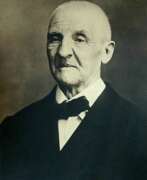

Anton Bruckner, full name Joseph Anton Bruckner, was an Austrian composer, organist and music educator.
Bruckner was born into a poor family, which prevented him from receiving an education suited to his musical talent. His father taught him to play the violin and organ, and he worked as a teacher and organist for many years. Already after the age of 30, he began composing organ and choral works, including the Solemn Mass (1854). In 1855 he became organist at Linz Cathedral and took a five-year course in harmony and counterpoint with the Viennese teacher Simon Sechter. A little later Bruckner studied orchestration with Otto Kitzler, who in 1863 introduced him to the music of Wagner - a powerful impetus for him to begin composing significant compositions.
After moving to Vienna in 1686, Bruckner taught at the Conservatory and the University of Vienna and composed at the same time. Over the next 28 years he wrote most of his famous works: symphonies Nos. 2-9, a string quintet and the Te Deum. But it was not until the premiere of his Seventh Symphony in Leipzig in 1884 that he received the recognition he deserved. Until his death, he continued to compose new works and rework his earlier works.
Anton Bruckner was an outstanding virtuoso organist and a superb teacher. His symphonies are often considered symbolic of the final phase of Austro-German Romanticism, and he also composed much sacred secular choral music and chamber works.
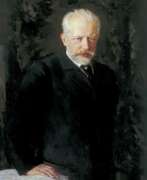

Petr Ilich Chaikovskii (Russian: Петр Ильич Чайковский) was a great Russian composer, teacher, conductor and music critic.
Petr was born into the family of a mining engineer; later his father became manager of the Alapaev and Nizhnekamsk factories and director of the Technological Institute in St. Petersburg. Already at the age of five Peter began to learn to play the piano and compose. Educated as a lawyer, he was appointed to the Ministry of Justice and retired in 1867.
In 1865, Chaikovskii graduated with honors from the St. Petersburg Conservatory, composing several significant works during his years of study. From 1866-1878, Chaikovskii was a professor at the Moscow Conservatory, translated several musical-theoretical works, and wrote A Guide to the Practical Study of Harmony. In 1868 he made his first appearance in the press as a music critic, and later worked as a music reviewer for the Moscow newspapers Sovremennaya Annals and Russkiye Vedomosti.
Petr Ilich destroyed his first operas - "Voevoda" and "Undina" - apparently dissatisfied with the result, but his next concertos and symphonies, the operas "Oprichnik" (1874) and "Vakula the Blacksmith" (1876) were already quite successful. In 1877 patron of the arts and admirer Nadezhda von Meck arranged for Chaikovskii to receive an annual subsidy of six thousand roubles, thanks to which he devoted his later life to composing, and from 1888 the composer also received an annual pension of three thousand roubles from the Russian Emperor Alexander III.
From the 1880s Chaikovskii became known not only in Russia but also abroad: he gave numerous concerts in European cities, and his music was recognized and loved in the USA.
A man of extraordinary sensitivity, Petr Chaikovskii revealed in music the inner world of man from lyrical intimacy to the deepest tragedy, creating the highest examples of operas, ballets, symphonies and chamber works. During this period he wrote the operas "Eugene Onegin" (1878), "The Maid of Orleans" (1879), "Mazepa" (1883), "Cherevichki" (1885), "Queen of Spades" (1890), "Iolanta" (1891) and others. And also ballets "Swan Lake" (1876), "Sleeping Beauty" (1889), "The Nutcracker" (1892). All of these works are still going with enduring success in all the world's theaters.
His cycle The Seasons and his Sixth Symphony ("Pathetique") are also widely known. Chaikovskii 's six symphonies, the symphony "Manfred" (1885), "Italian Capriccio" (1880), three concerti for piano and orchestra (1875-93), a concerto for violin and orchestra, "Variations on a Rococo Theme for Cello and Orchestra" (1876), a piano trio "In Memory of the Great Artist" (1882), and romances belong to the world's masterpieces.
Chaikovskii died unexpectedly, having contracted cholera during an epidemic in St. Petersburg. In honor of the composer in 1958, one of the most prestigious performing competitions was organized - the International Chaikovskii Competition, which is held in Moscow every four years. The city of Chaikovskii in the Perm Region, streets in many cities in the former Soviet Union, and a crater on Mercury are named in the composer's honor. The Moscow State Conservatory bears Tchaikovsky's name. Petr Chaikovskii is one of the most performed composers all over the world.
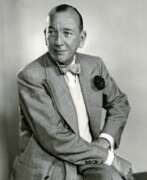

Noël Peirce Coward was an English playwright, composer, director, actor, and singer, known for his wit, flamboyance, and what Time magazine called «a sense of personal style, a combination of cheek and chic, pose and poise».
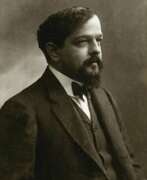

Claude Debussy, full name Achille-Claude Debussy, was a French composer, conductor, pianist and critic, a leading representative of Impressionism in music.
Debussy showed musical talent early and entered the Paris Conservatory. He lived in poverty, but at the same time he learned a luxurious life: the Russian philanthropist and the richest woman, Nadezhda Filaretovna von Meck, took him under her tutelage, he mused with her children and traveled with her around Europe. His sensitive nature could not but respond to all these contrasts. During this period Debussy created one of his masterpieces, Moonlight from the Bergamo Suite.
Debussy spent the summers of 1881 and 1882 near Moscow, at the von Meck estate. In this house Debussy became acquainted with the new Russian music of Tchaikovsky, Borodin, Balakirev and Modest Mussorgsky. His stay in Russia had a beneficial effect on the young musician's development. Debussy was also influenced by the work of Richard Wagner. He developed a highly original system of harmony and musical structure that in many ways expressed the ideals to which the Impressionist and Symbolist artists and writers of his time aspired.
Debussy toured with concerts and conducted his works in England, Italy, Russia and other countries. Claude Debussy's famous works include the Prelude to the Afternoon of a Faun (1894), the operas Pelléas et Mélisande and The Sea (1905), the suite Children's Corner (1906-1908) and the orchestral cycle Images (1912). In 1913 he composed music for the ballet Games, which was performed by Sergei Diaghilev's Russian Seasons company in Paris and London.
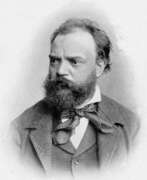

Antonín Leopold Dvořák was a Czech composer of the Romantic era and one of the founders of the Czech national school of music.
Dvořák showed musical talent early on and became an accomplished violinist. After graduating from the Institute of Church Music in Prague, he worked as a musician in various ensembles and taught, but lived very poorly. However, already in the 1860s he composed two symphonies, an opera, chamber music and many songs.
In 1875 Dvořák received a state scholarship from the Austrian government and met Johannes Brahms, with whom he developed a fruitful friendship. Dvořák's Moravian Duets (1876) for soprano and contralto and Slavonic Dances (1878) for piano duet first brought the composer and the music of his country to the world's attention. In 1884 he made a successful visit to England, and in 1890 the great composer Pyotr Ilyich Tchaikovsky arranged two concerts for him in Moscow. The following year Dvořák became an honorary doctor of music at Cambridge University.
In 1892 Dvořák accepted the post of director of the newly established National Conservatory in New York and, in addition to this work, traveled extensively in the United States, but in 1895 he returned to his homeland.
Through his work Dvořák expanded the path of the Czech national music school started by Bedřich Smetana. He composed in almost all classical music genres, and his symphonies and concertos, choruses and chamber compositions continue to be performed all over the world. Dvořák's best-known works include Symphony No. 9 "From the New World" (written in the USA), the opera Rusalka, the Concerto for Cello and Orchestra, the "American" String Quartet, Requiem, Stabat Mater and Slavonic Dances.
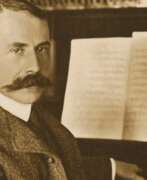

Edward William Elgar (Sir Edward William Elgar, 1st Baronet) was a British composer of the Romantic period.
The son of an organist, Elgar was a fine violinist, played the bassoon, and worked as a Kapellmeister and church organist. Then in Malvern, Worcestershire, he began composing music himself. He composed several major choral works, notably the oratorio The Light of Life (Lux Christi (1896,), and in 1898-99 he wrote the popular Enigma Variations for orchestra. Another major work followed in 1900, the oratorio The Dream of Gerontius, which is considered his masterpiece.
From 1905 to 1908 Elgar was the first Professor of Music at the University of Birmingham. During World War I, he periodically wrote patriotic works. His marches, introductions, symphonies, and concertos for strings are well known. Elgar's vibrant works contributed to the revival of English music in the 20th century during the transition from late Romanticism.
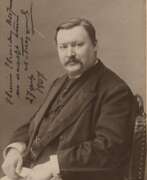

Aleksandr Konstantinovich Glazunov (russian: Александр Константинович Глазунов) was a Russian late Romantic composer, conductor and teacher.
Glazunov belonged to a well-known dynasty of book publishers in St. Petersburg and showed musical ability early on. He studied music with Balakirev and Rimsky-Korsakov, wrote his first symphony at the age of sixteen, and was noticed by the patron of the arts Mitrofan Belyaev, who became his admirer and benefactor. Thanks to him, the young Glazunov traveled all over Europe and was introduced in Weimar to Franz Liszt, who promoted the performance of his First Symphony at the congress of the General German Musical Union.
After the death of composer Borodin, Glazunov helped Rimsky-Korsakov finish his opera Prince Igor, and in the late 1890s he was already collaborating with the Imperial Theaters and writing three ballets. In 1899 Glazunov was appointed professor at the St. Petersburg Conservatory, and from the end of 1905 he became its director, retaining this post even after the October Revolution of 1917. Glazunov's personality is characterized by the fact that he spent his director's salary on helping poor students. And in general, during the hungry years of post-revolutionary devastation, he supported students, even if he did not share their musical beliefs - among them the greats Sergei Prokofiev and Dmitri Shostakovich.
In 1922, Aleksandr Glazunov was named People's Artist of the young Soviet republic. In 1928 he traveled to Vienna to take part in the jury of the Schubert Centenary Composition Competition and never returned to the USSR. However, even while living in Europe, he retained his Soviet citizenship. Officially, Glazunov's stay in Paris was explained by his serious state of health and the need for medical treatment. Already in 1972 Glazunov's ashes were transported to the USSR and reburied in the Alexander Nevsky Lavra.
In addition to ballets, Aleksandr Glazunov wrote eight symphonies (the ninth remained unfinished), seven string quartets and a great deal of orchestral music. He wrote mainly for piano and organ, and at the end of his life he composed works for saxophone - a solo concerto and a quartet for saxophones. Glazunov's most popular works today are his ballets The Seasons (1898) and Raymonda (1897), his Fourth, Fifth and Sixth Symphonies, the Polonaise from Les Sylphides, and his two concert waltzes.
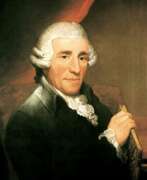

Franz Joseph Haydn was an Austrian composer of the classical school, who created the string quartet and symphony forms.
Haydn discovered unusual musical abilities very early, but the poverty of his family did not favor the development of his talents. He was a singer, interrupted earnings and engaged in musical self-education. Fate led young Haydn to Prince Pal Antal Esterhazy, whose wealthy and influential family of the Austrian Empire maintained his own orchestra. In 1766, Haydn became music director at the Esterhazy court and remained in that service for the rest of his life. In addition to his operas for the court, Haydn composed symphonies, string quartets and other chamber music. On one of his visits to Vienna, Haydn met Wolfgang Mozart, and their interactions brought many benefits to both great composers and musicians.
In the 1760s, Haydn's fame began to spread throughout Europe. In 1792, he met the young Ludwig van Beethoven and foreshadowed his greatest fame as a composer.
Haydn was an extremely prolific composer. He created 108 symphonies, many quartets, oratorios, sonatas, concertos, etc. As a true representative of the Enlightenment, Haydn was the most famous composer in Europe in the 18th century.
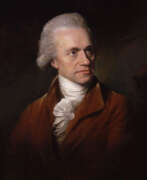

Frederick William Herschel (German: Friedrich Wilhelm Herschel) was a German-born British astronomer and composer. He frequently collaborated with his younger sister and fellow astronomer Caroline Herschel (1750–1848). Born in the Electorate of Hanover, William Herschel followed his father into the military band of Hanover, before emigrating to Great Britain in 1757 at the age of nineteen.
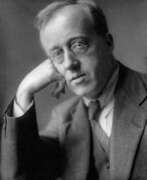

Gustav Holst, birth name Gustavus Theodore Von Holst, is an English composer and educator. Holst studied at the Royal College of Music in London, including playing the trombone, and for several years after graduation he earned a living as a trombonist in various orchestras. In 1905 he became a music teacher at St. Paul's Girls' School and later music director of Morley College, positions he retained throughout his life. A brilliant educator, Holst pioneered music education for women.
Holst's music is often built on English national folklore and has much in common with the work of composer and contemporary Vaughan Williams. However, he combines it with an international flavor based on the styles of Maurice Ravel, Igor Stravinsky, and other innovators, with a continuation of English Romanticism. This influence is reflected in Holst's most famous work, the orchestral suite The Planets. Also in the Hindu opera Savitri and other cosmopolitan works.
Holst's works also include the opera Sita, Hymn to Jesus for chorus and orchestra (1917); Ode to Death for chorus and orchestra (1919), the opera The Perfect Fool (1923), the Choral Symphony (1923-24), the Double Concerto for Two Violins and Orchestra (1929), and Hammersmith for Orchestra (1930).
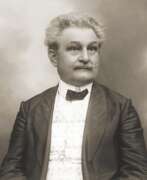

Leoš Janáček, birth name Leo Eugen Janáček, was a Czech composer and musicologist, folklorist, publicist and teacher.
Janáček was a singer in Brno, and studied at the Prague, Leipzig and Vienna Conservatories. In 1881 he founded the Collegium of Organists in Brno, which he directed until 1920. From 1881 to 1888 he directed the Czech Philharmonic Orchestra, and in 1919 he became professor of composition at the Prague Conservatory.
Janáček was deeply in love with national music, collecting folklore and publishing the journal Musical Pages. He was inspired by Moravian and other Slavic music, including Eastern European folk music, to create an original modern musical style.
In his early period of creativity, Janáček was strongly influenced by the musical style and aesthetics of his friend Dvořák. His first opera, Šarka (1887-88), was a romantic work in the spirit of Wagner and Smetana. In his later operas he developed his own distinctly Czech style, built on the intonations of his native speech and folk melodies. Janáček's most important operas are Jenůfa (1904) and Her Foster Daughter, which established the composer's international reputation; The Case of Macro Pulos (1926), From the Dead House (1930), and others. Most of Janáček's operas have been staged in Czech.
Janáček visited Russia three times, and his interest in Russian language and literature resulted in the opera Katya Kabanova (1921) and the orchestral rhapsody Taras Bulba (1918). Janáček also wrote a number of instrumental chamber works. The world-famous composer spent most of his life in Brno, where the vast majority of his works were performed for the first time. Today, Janáček is the most frequently performed Czech opera composer in the world.
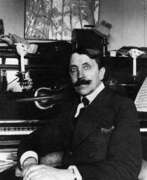

Michael Vasilyevich Matyushin (Russian: Михаил Васильевич Матюшин) was a pivotal figure in Russian art and music, known for his multifaceted talents that spanned painting, composing, and theoretical contributions to the avant-garde movement. Born in Nizhny Novgorod, Russia, in 1861, he initially made his mark as a musician, becoming the first violinist of the St. Petersburg Court Orchestra after studying at the Moscow Conservatory. Matyushin's artistic journey took a significant turn when he delved into painting, studying under various tutors and eventually meeting his future wife, Elena Guro, in an artist's studio. This partnership led to the creation of the "Crane" publishing house, fostering connections with futurists and other avant-garde artists.
Matyushin is perhaps best known for his theory of "extended seeing," which focused on the exploration of space and the interactions between color, form, and perception. This innovative approach aimed at extending the boundaries of human perception, a concept he developed further through his establishment of the Zorved group. His efforts were grounded in the belief that individuals could learn to perceive more than the visible, including information and events occurring outside their immediate sensory range.
His contributions to both the visual and musical arts culminated in notable works like the futurist opera "Victory Over the Sun," where his collaboration with Kazimir Malevich and Alexei Kruchonykh marked a significant moment in avant-garde history. After the Russian Revolution, Matyushin led an art class on Color at the Free Workshops, despite facing challenges from neoclassical revivalists. Despite these obstacles, he remained a prominent figure in Leningrad's Institute of Artistic Culture, where he continued his experimental work.
Today, Matyushin's legacy is preserved in the Museum of Avant-Garde in Saint Petersburg, housed in the very building where he lived and worked alongside other luminaries of the Russian avant-garde. For art collectors and experts, Matyushin's work represents a fascinating confluence of artistic innovation and theoretical exploration, highlighting his significant impact on both Russian art and the broader avant-garde movement.
For more insights and updates on Michael Vasilyevich Matyushin's influential works and theories, sign up for updates. This subscription will keep you informed about new product sales and auction events related to Matyushin's work, ensuring you're always at the forefront of the avant-garde art scene.
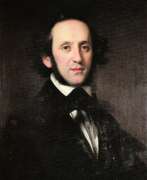

Felix Mendelssohn (full name Jakob Ludwig Felix Mendelssohn Bartholdy) was a German composer, pianist, conductor, teacher, and one of the greatest representatives of Romanticism in music.
Felix was born into a Jewish musical family that later converted to Christianity. He received a versatile education and already as a child wrote many musical compositions, including 5 operas, 11 symphonies for string orchestra, concertos, sonatas and fugues. Mendelssohn's first public performance took place in Berlin in 1818, when he was nine years old. In 1821 Mendelssohn was introduced to J.W. von Goethe, for whom he performed works by J.S. Bach and Mozart and to whom he dedicated his Piano Quartet No. 3 in B minor. A friendship developed between the famous wise poet and the 12-year-old musician.
A few years later, the talented musician began conducting in various orchestras in Europe, and became acquainted with Carl Weber. In England, where Mendelssohn visited very often, by the middle of the 19th century his music had become very popular, even with Queen Victoria he was the most favorite composer. He dedicated his Symphony No. 3 in A minor major (Scottish Symphony) to the Queen.
Among Mendelssohn's most famous works are A Midsummer Night's Dream (1826), the Italian Symphony (1833), a violin concerto (1844), two piano concertos (1831, 1837), the oratorio Elijah (1846) and several chamber pieces. The tradition of playing the "Wedding March" from A Midsummer Night's Dream in wedding processions dates back to its performance at the wedding of a royal princess in 1858, already after Mendelssohn's death.
In 1843, Mendelssohn founded a conservatory in Leipzig, where he taught composition with Schumann. Mendelssohn was one of the first great Romantic composers of the nineteenth century.
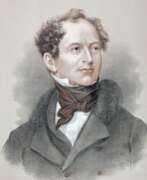

Thomas Moore was a British poet, songwriter and composer, a representative of Irish Romanticism.
Thomas graduated from Dublin University, from the age of 14 he collaborated with various Dublin journals. In 1800 he published his "Odes of Anacreon", and a year later - a collection of Poems by the late Thomas Little ("Poems by the late Thomas Little") and became widely known. Visiting the United States, Moore published a collection of poems, where he spoke about this country very sharply.
In 1812, Thomas Moore met Byron, became his close friend and wrote one of the best biographies of him, published in 1835. Moore's most famous works are "The Last Rose of Summer" and the collection "Irish Melodies" (1807-1834), which brought him a stable income for many years. In Russia, however, he is known primarily for the poem Those evening bells from the collection published in 1818. The poem was translated by Ivan Kozlov, and it turned into the famous and beloved song "Evening Bells".
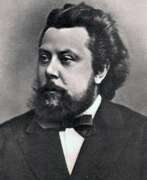

Modest Petrovich Musorgskii (russian: Модест Петрович Мусоргский) was a Russian composer and pianist.
Born into an old Russian noble family, Modest was trained on the piano from an early age, then served as an officer in the Life Guards of the Preobrazhensky Regiment. In 1856-57 Mussorgsky became acquainted with the composer Alexander Borodin, and later with Alexander Dargomyzhsky, Cesar Cui, Mili Balakirev and the music critic Vladimir Stasov. Together they formed a friendly community that became known as the Mighty Handful.
In 1858, Musorgskii left military service and took up only music. Later, however, for the sake of earning money, he was forced to enter the civil service and work in various official positions. In music he tried for a long time to find his own style, experimented a lot, took on different genres. He composed piano and orchestral works, many satirical romances, vocal pictures and songs with vivid characters. Musorgskii's symphonic work Intermezzo (1861) and fantasy Night on Bald Mountain, the cycle of pieces Pictures at an Exhibition, written for piano in 1874 as musical illustrations to Victor Hartmann's watercolors, and the vocal cycle Children's, which included seven pieces, are widely known and often performed.
Musorgskii gradually became popular in Russia and abroad. The pinnacle of Musorgskii's work in the 1860s was his opera Boris Godunov, based on Alexander Pushkin's drama, staged at the Mariinsky Theater in St. Petersburg in 1874. In 1872 he almost completed his last opera, Khovanshchina; Sorochinskaya Yarmarka and several other operas remained unfinished.
After Musorgskii's death, his friend the composer Rimsky-Korsakov decided to put all his works in order and publish them. He made many changes to the melodic and harmonic order of the compositions completed by the author, including Boris Godunov.
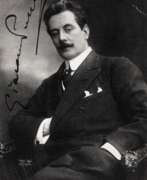

Giacomo Puccini, full name Giacomo Antonio Domenico Michele Secondo Maria Puccini, was an Italian opera composer, organist and choirmaster.
Puccini was born into the family that for two centuries directed the musical organization of the Cathedral of San Martino in Lucca, and the young musician inherited the position of cathedral organist until his adulthood. He also played organ in small local churches. Giuseppe Verdi's opera Aida, which he saw in Pisa in 1876, was a boost for him and he entered the Milan Conservatory in 1880.
Puccini carefully studied contemporary operatic compositions, particularly the work of Claude Debussy, Richard Strauss, Arnold Schoenberg, and Igor Stravinsky. Soon he wrote Triptych (1918), three one-act operas - the melodramatic The Cape, the sentimental Suor Angelica and the comic Gianni Schicchi. Puccini's other mature operas are La bohème (1896), Tosca (1900), and Madama Butterfly (1904).
The composer did not manage to finish his last opera, Turandot - he died of cancer with its score in his hands. This work is the only Italian opera in the Impressionist style. Puccini is also considered the greatest representative of opera realism, as well as the Verismo movement in music, attempting to faithfully portray the social and psychological conflicts of the new national-historical reality after the unification of Italy.
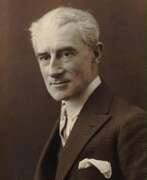

Maurice Ravel, full name Joseph Maurice Ravel, was a French composer, pianist and conductor, a representative of Impressionism in music.
At the age of 14 Maurice entered the Paris Conservatory and during his studies he composed several works. Already in these early sonatas and compositions he skillfully adapted traditional structures in music to his own personal ones, thus creating his own musical style.
Of Ravel's piano works, the virtuosic "Miroir" and "Gaspard de la Nuit" are popular, while of his orchestral works the most famous are the "Spanish Rhapsody" and Bolero. After 1905, Ravel's name is placed almost on a par with the recognized Impressionist composer Claude Debussy. Ravel met the famous Russian entrepreneur and organizer of the Russian Seasons, Sergei Diaghilev, which was a highlight in his career. He was specially commissioned by him to compose music for Mikhail Fokine's ballet Daphnis and Chloe (1912), starring the great Russian dancer Vatslav Nijinsky.
Ravel toured extensively as a pianist and conductor, performing his own works in Italy, Holland and England. In 1928, he made a successful four-month tour of Canada and the United States, where he impressed with jazz and blues compositions.
Maurice Ravel has gone down in history as one of the leading exponents of musical impressionism.
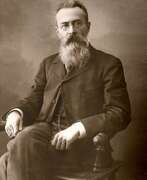

Nikolai Andreevich Rimskii-Korsakov (russian: Николай Андреевич Римский-Корсаков) was a Russian composer, teacher and conductor, music critic, and member of the Mighty Handful.
Originally from an old noble family, Rimskii-Korsakov studied piano from the age of six and by the age of nine was already trying to compose music. After graduating from the St. Petersburg Naval School, in 1862-1865 he was on a round-the-world voyage, during which he was made an officer. He participated in an expedition to the shores of North America, visited Great Britain, Spain, Norway. In 1873-1884 he worked as an inspector of military bands of the fleet.
During his studies at the school and during the expedition Nikolai Rimskii-Korsakov continued to study music. His acquaintance in 1861 with the composer Miliy Balakirev and his circle "The Mighty Handful", which included composers Caesar Cui, Modest Mussorgsky and Alexander Borodin, became the impetus for his work. Rimskii-Korsakov 's aesthetic views and worldview were formed under the influence of the "Mighty Handful" and its ideologist V. Stasov.
Nikolai Rimskii-Korsakov was very prolific, and almost all of his works are based on folk and classical Russian literature and melodies. He composed 15 operas, including The Pskovite Girl (1872), May Night (1879), The Snow Maiden (1881), Sadko (1896), The Tsar's Bride (1898), The Tale of Tsar Saltan (1900), Kashchey the Immortal (1902), The Tale of the Invisible City of Kitezh..." (1904), The Golden Cockerel (1907). Fragments from some operas have become the most performed in the world, among them "The Song of the Indian Guest" from "Sadko" and "The Flight of the Bumblebee" from "Saltan".
The composer's works also include three symphonies (the first of which he completed while sailing around the world), symphonic works, instrumental concertos, cantatas, chamber instrumental, vocal and sacred music. In 1886-1890 Rimskii-Korsakov conducted the "Russian Symphonic Concertos" in St. Petersburg, and in 1898 - in Moscow, at the same time he was also engaged in teaching. In 1871 he became a professor at the St. Petersburg Conservatory, where he taught classes in practical composition, instrumentation and orchestration.
As a teacher, Rimskii-Korsakov trained over 200 composers and musicians, including Alexander Glazunov, Mikhail Gnesin, Alexander Grechaninov, Anatoly Lyadov, Sergei Prokofiev, and Igor Stravinsky. He also published several textbooks on harmony and orchestration. Rimskii-Korsakov's work had a great influence on the development of Russian classical and foreign music.
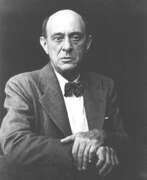

Arnold Schoenberg, real name Arnold Franz Walter Schönberg, was an Austrian and American composer, representative of musical expressionism, teacher, musicologist and conductor.
Schoenberg came from a Jewish family and began studying the violin at the age of eight and later the cello. While working as a bank clerk, he simultaneously studied composition with Alexander Zemlyansky (1871-1942) and soon wrote his first string quartet (1897) to acclaim. With the help of Richard Strauss, he obtained a teaching position in Berlin, and lived for a time in two cities. In 1904, Alban Berg and Anton Webern began studying with Schoenberg, and this largely determined their future artistic careers.
Around 1906, through much experimentation, Schoenberg came to the conclusion that tonality should be abandoned. He created new methods of music-making and composition involving atonality. In the subsequent period of "free atonality" from 1907 to 1916, he composed the monodrama "Reason", "Five Orchestral Pieces", "Pierrot Lunaire" and other works.
In 1933, due to the rise of National Socialism in Germany, Schoenberg was expelled from the country and emigrated to the USA, in 1941 he took American citizenship and taught at the University of California at Los Angeles until 1944. The works of this period demonstrate the composer's ever-increasing skill and freedom in the use of the 12-tone method.
Although Schoenberg was never accepted by the general public, he nevertheless had a significant influence on 20th century music, being the founder of the New Viennese School of Composition.
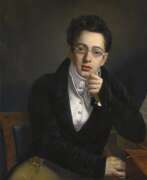

Franz Peter Schubert was an Austrian composer who combined classical and romantic music.
Franz was born into a musical family, where a quartet played at home and his father founded a music school. The future composer played the violin, piano and organ. At the age of 10, the young Schubert won a place in the Vienna Imperial Court Chapel Choir and quickly gained a reputation as an aspiring composer, writing several light string quartets. In 1814 Schubert began teaching, but at the same time he continuously composed a wide variety of works. These included 145 songs, the Second and Third Symphonies, two sonatas and a number of miniatures for solo piano, two masses and other short choral works, four stage works, a string quartet, and much more.
Soon the popularity of Schubert's dance music and songs grew so much that musical evenings known as "Schubertiades", where Schubert performed his own compositions while accompanying himself on the piano, became fashionable in Vienna. The talented composer effortlessly composed many masterpieces, including the song cycles Lonely Müllerin and Winterreise, as well as the Eighth ("Unfinished") and Ninth ("Great") Symphonies, the Octet for winds, three string quartets, two piano trios, the String Quintet, the Wanderer Fantasia and six sonatas for solo piano.
Despite his boundless talent, Franz Schubert was always insecure, indecisive and reserved, causing him to be tormented by lack of money throughout his life. The composer was able to buy his own piano almost at the end of his short life - with the royalties from his first and only public concert in March 1828. Eight months later, the brilliant musician died of illness at the age of 31.
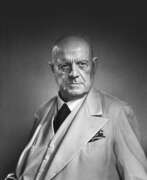

Ean Sibelius, birth name Swedish Johan Julius Christian Sibelius, is a Finnish symphonic composer and a prominent representative of the Finnish national art.
Sibelius was born in a city belonging to the Russian Empire to a family of Finnish Swedes. At the age of about 20, he left Finland to pursue music studies in Berlin and Vienna, before returning to his homeland. Sibelius' first large-scale orchestral work, the Kullervo Symphony ((Kullervo, 1892), created a sensation in his homeland. His next works - En Saga (1892), Karelian Music and Four Legends - established him as Finland's leading national composer working in the Romantic tradition. These were years of patriotic upheaval in Finland, and in recognition of his merit and genius, the Finnish Senate granted Sibelius a lifetime pension.
The composer's main creative achievements relate to orchestral music, including 7 symphonies, symphonic poems and suites. The violin concerto, the orchestral "Sad Waltz" and the choral "Hymn of Finland" are also widely known. Many of Sibelius' compositions are directly or generalized related to Finnish national themes. He is a prominent representative of the "golden age" of Finnish art in the period 1880-1910.
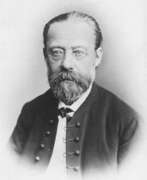

Bedřich Smetana, baptized Friedrich, was a prominent Czech composer, pianist and conductor, and the founder of the Czech national school of composition.
Smetana studied music under his father, who was an amateur violinist, and also began piano lessons early and performed as early as the age of six. He later became a music teacher and opened a piano school in Prague in 1848. Smetana was a recognized piano virtuoso.
In 1856 Smetana wrote his first symphonies and in the same year was appointed conductor of the philharmonic of Gothenburg (Sweden), where he remained until 1861, and then, returning to his homeland, he became one of the founders of the national opera theater. Smetana's first opera, The Brandenburgers in Bohemia, was staged in Prague in 1866, and in the same year the public saw his second opera, The Sold Bride, and he gained a reputation as the national Czech composer.
By the end of 1874 Smetana had gone completely deaf, but for several years he continued to create: he wrote a cycle of six symphonic works, concertos, many piano pieces and other works. Smetana's works, in particular The Sold Bride, My Country and the Piano Trio, are still performed all over the world.
Bedřich Smetana is rightly considered the founder of the national school of composition: he was the first composer to use Czech folk themes and motifs in his works, and the opera Brandenburgers in Bohemia was written entirely in Czech for the first time. Smetana's work had an enormous influence on Czech composers of subsequent generations - Antonín Dvořák and Zdeněk Fibich - and the symphonic poem Vltava from the cycle My Homeland became the unofficial Czech national anthem.
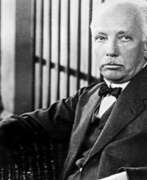

Richard Strauss, full name Richard Georg Strauss, was a German composer of the late Romantic era, a bright representative of German expressionism, and a conductor.
Richard received his first musical education from his father, a virtuoso French horn player at the Munich Opera. The boy was very musical and from the age of six began composing pieces. Growing up, Strauss led a successful career as a conductor of leading orchestras in Germany and Austria. In 1889 in Weimar he conducted the first performance of his symphonic poem Don Juan, which was received with triumph. Strauss was hailed by critics as Wagner's heir and from that moment his career as a composer began.
In 1904, with his singer wife Paulina Maria de Ana, who was an outstanding performer of his songs, Strauss made a concert tour of the United States.
Richard Strauss equally idolized Wolfgang Mozart and Richard Wagner, and much of his work grew out of this reverence. He excelled at writing works for large orchestra, but he was equally successful at subtlety in chamber music. The composer possessed unrivaled descriptive power and the ability to convey psychological detail. This was particularly evident in his operas Guntram, Salome, Elektra and others.
Together with Gustav Mahler, Richard Strauss represents the late flowering of German Romanticism, which combined innovative subtleties of orchestration with an innovative harmonic style.
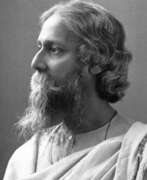

Rabindranath Tagore was a South Asian Bengali polymath who worked as a poet, writer, playwright, composer, philosopher, social reformer and painter. He reshaped Bengali literature and music as well as Indian art with Contextual Modernism in the late 19th and early 20th centuries. Author of the "profoundly sensitive, fresh and beautiful" poetry of Gitanjali, he became in 1913 the first non-European and the first lyricist to win the Nobel Prize in Literature. Tagore's poetic songs were viewed as spiritual and mercurial; however, his "elegant prose and magical poetry" remain largely unknown outside Bengal. He was a fellow of the Royal Asiatic Society. Referred to as "the Bard of Bengal", Tagore was known by sobriquets: Gurudev, Kobiguru, Biswakobi.
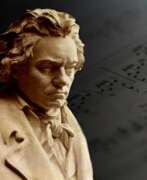

Ludwig van Beethoven was a German composer, pianist, and conductor, one of the most famous and celebrated composers in world history.
Beethoven showed an aptitude for music at a very early age; from the age of four his father began to teach him. Beethoven's early works - piano sonatas and symphonies - were composed under the strong influence of the music of the great classical composers Joseph Haydn and Wolfgang Amadeus Mozart. As Beethoven matured, however, he began to experiment with new forms and harmonic sequences, and his music became more complex and emotionally charged.
Unfortunately, at the height of his talent, Beethoven began to gradually lose his hearing, to the point of complete deafness by the end of his life. Despite this, he continued to compose and conduct, using special devices to feel the vibrations of the music.
Beethoven's work is considered pivotal in classical music and is a bridge between the classical and Romantic eras. His works vividly express a wide range of emotions, from triumph and joy to sadness and despair. Beethoven was also one of the first composers to include soloists and chorus in his symphonies. Beethoven's best-known works include nine symphonies, 32 piano sonatas, 16 string quartets and the heroic opera Fidelio. These and many other works have cemented Beethoven's place in music history as one of the greatest composers of all time. His music continues to be played and studied by musicians and music lovers around the world.
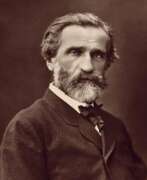

Giuseppe Verdi, full name Giuseppe Fortunino Francesco Verdi, was an Italian opera composer.
The son of a village innkeeper, Giuseppe showed musical talent very early, already playing the organ in church by the age of nine. He studied music in Milan, taught, and in March 1839 staged his first opera "Oberto, conte di San Bonifacio" at La Scala. In 1842 Verdi's opera "Nabucco" was a great success, passing through all the major theaters of Europe.
Verdi wrote a total of 26 operas during his career, the most famous of which are Rigoletto (1851), Trovatore (1853), La Traviata (1853), Don Carlos (1867), Aida (1871), Otello (1887) and Falstaff (1893).
In 1873, Giuseppe Verdi decided to retire from the world of opera. He settled in Sant'Agata, where he became a large landowner and a very wealthy man due to his tireless work in agriculture, he also financed large charitable organizations.
Verdi took a break from these activities for his opera Otello, but after a successful tour of Europe with it, he retreated again to Sant'Agata. The work of Giuseppe Verdi is one of the greatest achievements of world opera art. Many generations of opera lovers still enjoy the composer's brilliant works.
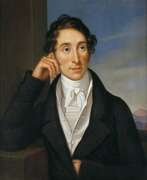

Carl Maria von Weber, full name Carl Maria Friedrich Ernst von Weber, was a German opera composer and conductor during the transition from classical to romantic music, pianist and music critic.
Weber was born into a musical and theatrical family, and his father cherished dreams of making him a second Mozart. The young Weber received his first appointment when he became the musical director of Duke Eugene of Württemberg, for whose private orchestra he wrote two symphonies, then he was secretary at the court of King Frederick I of Württemberg. At the same time he composed musical works, gaining experience and knowledge.
In 1813 Weber was appointed conductor of the opera in Prague, and four years later he was appointed director of the German opera in Dresden. Here he deployed his talents, taking on the entire job of preparing an opera production: he selected the repertoire, staff and actors; he handled the scenery, lighting and staging, as well as the orchestra and singers, taking special care to ensure that each performer fully understood the words and plot of each opera. The composer also found time to compose his own works.
During this period he created the opera The Free Rifleman (1821), where he was able to free German opera from French and Italian influences. The opera was first successfully staged in Berlin and then traveled throughout Europe. "The Free Rifleman" is the most popular German opera written to date, and it marked the beginning of German Romantic opera. Weber also wrote the operas Euryanthe (1823), Oberon (1826), and others.
Carl Weber composed many fugues, sonatas, concertos, and sacred music, and was also one of the significant piano virtuosos and music critics. From 1809 to 1818, he wrote a considerable number of reviews and quite incisive music criticisms. All his activities, music and critical writings promoted the ideals of Romanticism as an art in which feeling prevails over form and heart over head.
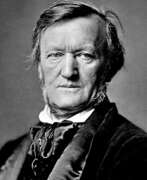

Wilhelm Richard Wagner was a German pioneering composer, conductor and opera reformer.
His first proper Symphony in C major was performed at the Leipzig Gewandhaus concerts in 1833. Wagner lived in a colony of poor German artists and made his living in music journalism. Nevertheless, in 1841 he wrote his first representative opera, The Flying Dutchman, based on the legend of a ship captain doomed to sail forever. In 1842 his Rienzi was triumphantly performed in Dresden, after which Wagner was appointed conductor of the court opera and held this position until 1849.
In 1848-49 Wagner became involved in the German Revolution, wrote a number of articles in support of it, and took an active part in the Dresden Uprising of 1849. When the uprising failed, he was forced to flee Germany. His subsequent years were occupied mainly with writing theoretical treatises on philosophy and music. Wagner held anti-Semitic and Nazi views. And reflecting on the future of music, he predicted the disappearance of opera as an artificial entertainment for the elite and the emergence of a new kind of musical stage work for the people, expressing the self-realization of free humanity. This new work was later called "musical drama."
By 1857 his style had been enriched with new interpretations, and Wagner had composed "Rheingold," "Die Walküre," and two acts of "Siegfried." By 1864, however, unwise financial habits had driven him into debt and ruin, and he was forced to flee from prison to Stuttgart. He was rescued by King Louis II, an ardent admirer of Wagner's work. Under his patronage for six years in Munich, the composer's operas were successfully staged. The King also practically ensured him a trouble-free life, thanks to his support Wagner built his own opera house (Bayreuther Festspielhaus), in which many new constructive ideas were realized. The premiere of "The Ring" and "Parsifal" took place here.
As a result of all Wagner's creative innovations and methods, a new kind of art emerged, the distinctive feature of which was a deep and complex symbolism, operating in three inseparable planes - dramatic, verbal and musical. He had a significant influence on European musical culture, especially on the development of opera and symphonic genres.
Richard Wagner's major works include The Flying Dutchman (1843), Tannhäuser (1845), Lohengrin (1850), Tristan und Isolde (1865), Parsifal (1882), and his great tetralogy, The Ring of the Nibelung (1869-76).
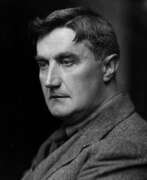

Ralph Vaughan Williams was a British composer, organist, conductor and teacher.
Vaughan Williams studied at the Royal College of Music and Trinity College, Cambridge, continued his studies in Berlin and Paris, and worked as a music editor for a magazine. After artillery service during the First World War, he became Professor of Composition at the Royal College of Music. All the while he was engaged in folkloristics, collecting English folk tunes and songs, which was reflected in his later work.
In addition to teaching and composing, Williams was active as a conductor, including the Bach and Handel Society choirs.
Vaughan Williams' legacy is extensive: he composed six operas, three ballets, nine symphonies including the London Symphony, cantatas and oratorios, works for piano, organ and chamber ensembles, arrangements of folk songs and many other works. Vaughan Williams managed to break away from German traditions and create a truly national, English tradition in the creation of classical music. He is one of the founders of the new English school of composition - the so-called "English musical renaissance".
